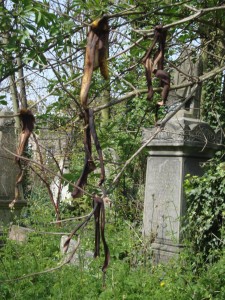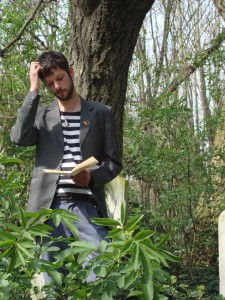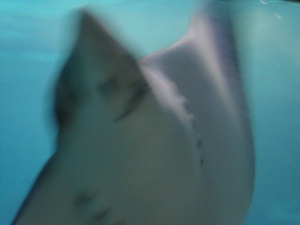A walk in the park with Tim Caines, Conservative Council Candidate for Harringay Ward (London Borough of Haringey)
Walking around Clissold Park in Stoke Newington with Tim Caines, Conservative Council Candidate for Harringay Ward (London Borough of Haringey)we talk about abortion rights, tennis and girls. When I first met Tim, at The Royal College of Surgeons of England where we both work, I learnt very quickly that he was the deputy leader of the Tottenham Conservatives Association. Not knowing very many other 27 year old Conservatives, I asked him about his motivations for joining. ‘Well, it’s a bit embarrassing, but I thought it would be a good way to meet girls,’ he told me as we strolled. Of course. Did it work? ‘No, actually most of the association turned out to be gay men.’
With the general election coming up, I had decided to do more research into the parties. Stingray is not a political magazine, but it does encourage discussion about social issues. As a small not-for-profit venture, Stingray aims to promote both emerging voices, from both writers and artists, and those with a story who wouldn’t necessarily consider themselves either. For grass-roots projects such as this to survive, society needs to value creative expression. The Conservatives’ policies have historically seemed to put the economy first at the expense of the arts. Shadow culture secretary Jeremy Hunt has been doing his best to change this perception, but is it enough?
Tim had been to a classical music concert the night before we met to talk about politics. ‘It was the first time I had heard Mozart’s Requiem,’ he said. ‘It was amazing.’ In an interview with Charlotte Higgins in January (Higgins, C 2010 Arts funding cuts proposed by the Conservatives, The Guardian London, 14 January 2010 viewed 2 May 2010 http://www.guardian.co.uk/culture/2010/jan/14/arts-funding-cuts-proposed-conservatives) Jeremy Hunt said that ‘there are too many children who do not have exposure to the arts. A new way to improve engagement is not by targets but by technology – such as the Royal Opera House’s experiment in broadcasting operas to 80 digital cinemas.’ Tim agrees this can be an economical way to promote the arts, and is also enthusiastic about a Conservative initiative ‘to set up a nationwide national music competition – sort of a ‘Britain’s Got Talent’ really!’ I suggest that ministers could get involved in this. Perhaps the process of voting could be like X-factor with Brown crooning ‘Non, je ne regrette rien’ and Cameron trying to pull off Lady Gaga . This wouldn’t be so far from the reality – when voters do not know enough about policies, only the public personas of the politicians, it becomes a superficial contest. ‘Well Gordon Brown did have an Elvis impersonator following him on the campaign trail, apparently,’ says Tim.

Tim Caines and the Conservative manifesto
Initiatives to make the arts more accessible to young people would be a great thing, but I ask Tim about what will happen with all of the children who have been so well educated grow up and want to start their own projects. Will there be any support from the state? ‘Well, unfortunately whatever happens in May, public funding including for the arts is going to suffer. I recently met a stage director who told me that even at the moment, they’re being bled dry. But it’s not all doom and gloom. I think that if people build a network of people they will have a good chance of success.’ Private investors? ‘Yes. The Conservative view is that the state is there to support, but not there to command and control. But it’s a blurred line – and I know it’s a competitive market, as it is. That’s why I admire people who set up things themselves, like Stingray.’
So with the Conservatives wishing to bring back philanthropy in a big way, the message seems to be that the arts would need to fend more for itself. Tim and I walk past the park’s massive paddling pool, empty of water until the summer. I think of a world without art: dry, and shallow. There is something beautiful about the pool, a wide expanse of sky-blue just waiting to be filled. It’s closed off to the public, but we climb over the fence, Tim offering his hand and I holding his blue Conservative manifesto in turn. ‘The arts can become so sophisticated and often fiercely critical of the state itself. Art will never die. The more it suffers, the greater it is!’ Tim’s view of art is optimistic and something echoes with me about the need for independence. But I feel that the role of the artist should not be romanticised and we should never take for granted that we live in a society where we have freedom to express ourselves.
‘Society is made up of a collection of individuals. Artists often view society from afar. Perhaps the artistic life is a lonely life, or very difficult. Art is a social diagnostician of society. Artists are like doctors, they can know more about you than you do.’ We have moved on, to Stoke Newington’s famous Abney Park Cemetery. ‘It’s rather sad, when you think of all the important occasions that must have happened here, that it’s been left to ruins,’ Tim says thoughtfully as we look into the remains of the cemetery’s chapel. ‘It makes me think of Thomas Hardy, who wanted to be buried where his wife was at Stinsford, but after his death his body was taken to Westminster Abbey. They kept his heart so it could remain at Stinsford but there is a myth that the surgeon’s cat ate it, and it had to be replaced by someone else’s.’
Tim is an avid reader. ‘I might as well get on with the classics now. My father has a crass expression which he got from a business development book, ‘every reader is a leader.’ I think that reading literature widens your mind – all art puts you in touch with social realism.’ Perhaps we better hope that whichever leader is successful on May 6, they are also a reader. Wooing arts bodies is one thing, but let us hope the politicians do not remove their hearts.
Arts funding cuts proposed by Conservatives











